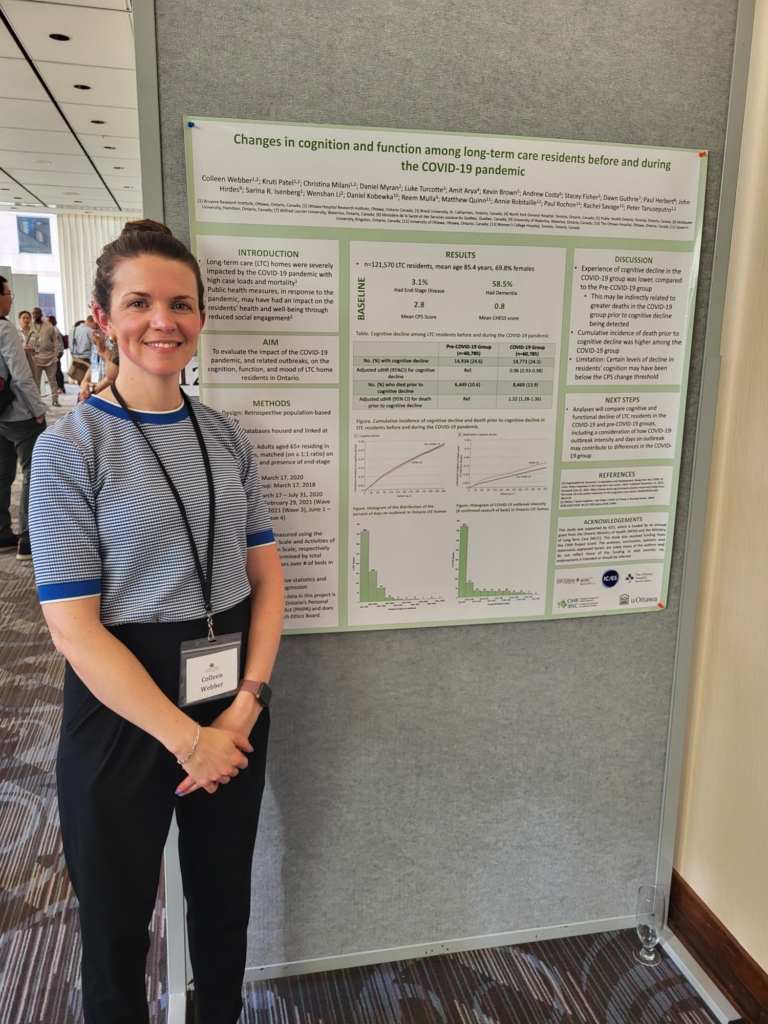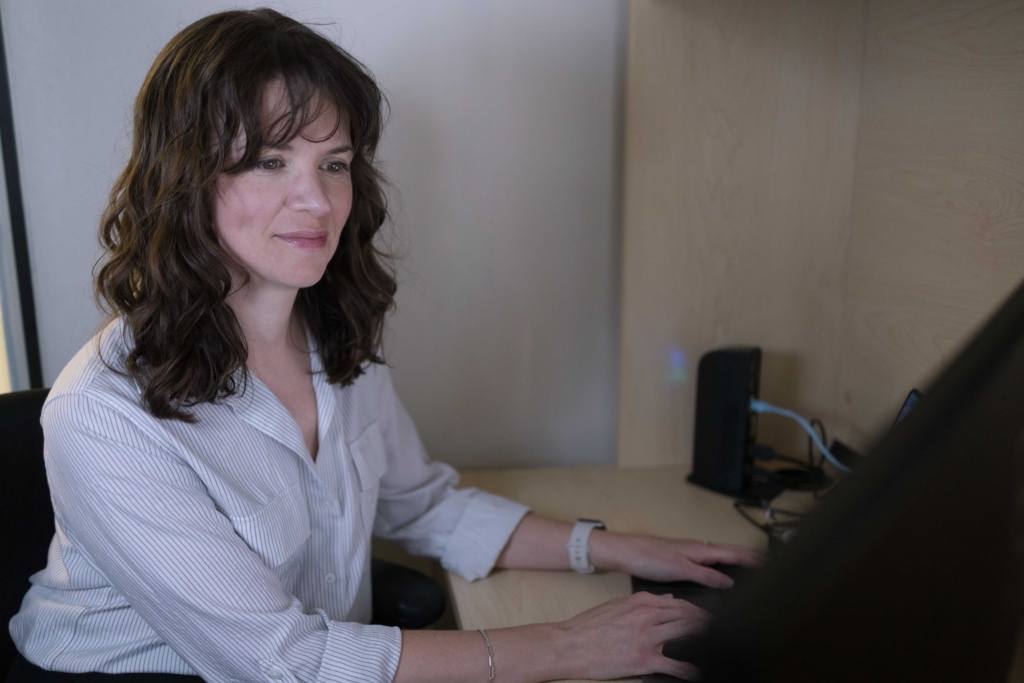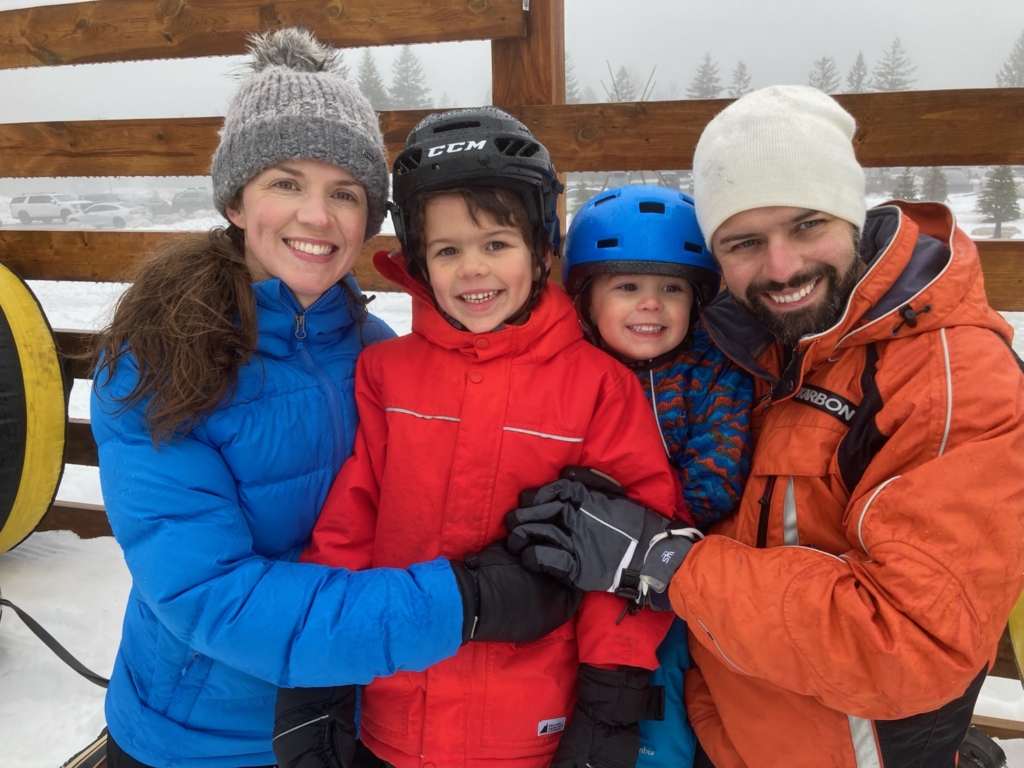Dr. Colleen Webber didn’t always want to go into healthcare, and especially not into research. But after a placement in her masters, she fell in love with the process of looking for answers to life’s big questions.
With two master of science degrees — one in occupational therapy and the other in epidemiology — and a PhD in epidemiology, Dr. Webber is putting her rigorous education to work as Senior Clinical Research Associate and Postdoctoral Fellow at The Ottawa Hospital looking into palliative care for people living with schizophrenia.
In recognition of her important research into this subject as a trainee, Dr. Webber has been named the 2023 recipient of the Clinical and Applied Health Researcher in Training Award.
Read on to learn what motivates Dr. Webber’s research and why end-of-life care is so important.
Q: What were your early years like?
A: I was born in Atikokan, northern Ontario, and grew up there until university. It was very lovely to live in but very isolated. I always enjoyed school and enjoyed science and math. I never had very strong career ambitions, but I always wanted to go to university and get out of the small town, so I moved to Hamilton to go to McMaster University for an undergraduate degree in psychology.
Q: How did you decide to pursue science and research?
A: My bachelor’s in psychology was a great degree for when you don’t know what you want to do. In the courses I took, though, I found it was hard to see the connection to why the research was being done, why it was important. After I finished, I decided I wanted to do something health related.
“I liked the opportunity to have a question that you want to answer and then be able to answer it.”
— Dr. Colleen Webber
I completed a master’s in occupational therapy at the University of Toronto, and that’s where I got into research. We had to do a research project on top of clinical training, and my project was looking at the academic experiences of university students with mental health issues. I came to the realization that I was better suited to a research environment than a clinical, patient-facing environment, so I went back to get another master’s degree in epidemiology, followed by a PhD in epidemiology from Queen’s.
With research, I liked the opportunity to have a question that you want to answer and then be able to answer it.
Q: Can you describe the research you’re currently working on?

A: The research I’m doing right now is on palliative and end-of-life care for individuals with schizophrenia. I’m really interested in vulnerable and marginalized populations that the healthcare system may not be best set up to serve at this time.
We know palliative care is such an essential component of having a good death. So, we’re looking to see if they’re getting palliative care, and when it’s being delivered — is it coming very late and close to death? We’re also trying to see where they’re dying, the place of death. Most people don’t want to die in hospitals, but it is still very common. We want to make sure end-of-life care is delivered in the place that people want to be, which is most often at home.
This study is being conducted on everyone in Ontario, so the data we have is population level. The main goal is to figure out if there are differences in healthcare and outcomes for this population and then how can we better structure care to meet the needs of people with schizophrenia.
We’re still fairly early on in the research, but I think one of the things that’s been highlighted in our findings so far is that people with schizophrenia more likely to be in long-term care before death. Which leads to questions like: Are long-term care homes set up to support the complex mental health and end-of-life care needs of older adults with schizophrenia? Are the staff trained on aging with schizophrenia? Could older adults with schizophrenia live in the community if they had better resources to support them?
Q: What motivates your research?
A: As part of this project, we’ve put together a patient and family advisory council, and we’ve also partnered with different community, provincial, and national organizations that support individuals with schizophrenia. Those groups motivate me, because you hear the stories of what they’re going through — the experiences and challenges they face accessing the healthcare system. As researchers, we can look at the evidence and look at the gaps, but it’s people with the lived experience who can tell us what’s important to them. It’s getting the questions we should be asking. I come out of those meetings invigorated to do the work. It’s a reminder that what we’re doing could make a difference.
One of the things I’ve always liked about epidemiology is that it’s very much applied and can have a direct impact on patients. You can see how the work you’re doing changes how healthcare is delivered.

Q: What’s something surprising or unusual about your field?
A: Many people are very uncomfortable talking about death and dying, and I think I’ve come to have a better appreciation for the importance of talking about it. And there’s a need for an increasing role for palliative care across care settings. It’s not just a specialist approach; it needs to be integrated into all aspects of care.
Q: What would you tell someone who’s considering coming to The Ottawa Hospital for a career in research?
A: The environment and culture at The Ottawa Hospital is very supportive. It has such a diverse range of research that it’s easy to find your home — a group doing something in your little niche. It’s also very supportive of trainees; they’ve put in the processes and supports to help trainees meet their goals.
“I don’t think I’d be here with this award if I didn’t have all that support.”
— Dr. Colleen Webber
Q: How does it feel to win this award?
A: I was very happy to receive it. I know OHRI has amazing trainees, so I’m sure the competition was very good. It’s an honour to receive it and have my work recognized.
Q: Where would we find you outside of work?
I have two little boys, so you’d probably find me chasing them around — swimming in the summer, playing in the back yard, going to parks. I also stay busy reading, running, and trying to teach myself how to sew.


